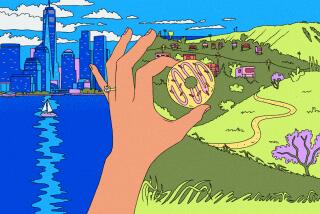Laughter takes the high road
Los ANGELES TIMES columnist Al Martinez grew up in Oakland, hardscrabble style, with a mother who loved to travel. Though the family was poor, she would use any extra cash to buy a bus ticket somewhere, anywhere. Her travels took her to Santa Fe, N.M., where she was born, and to Texas. “They were the best times of her life,” writes Martinez. “And she never stopped talking about them.”
His mother once hurled the worst condemnation she could muster -- “You’ll never even get anywhere close to Santa Fe! You’ll die in Oakland...!” -- at her prodigal son. “I’ll Be Damned If I’ll Die in Oakland,” Martinez’s collection of travel essays (most of them light-hearted, some darker), is a retort to that long-ago curse, a tongue-in-cheek way of showing that he’s made something of himself.
Martinez’s first big adventure abroad -- not an exploit he’d had in mind -- starts the collection. As a Marine Corps reservist, he was sent to the “police action” in Korea in the 1950s; his first child, Cindy, was born while he was gone. “War is not included in most travel books,” he writes, but it “does involve an essential form of travel that has transported [the young] to dark and violent places.” Having left for the battlefield a very young man, he tells us, he came home “too sad and too old.”
In contrast to the somber tone of this piece, slapstick tales of family travel (such as the time he and his wife, Cinelli, took the kids on a road trip across the United States in a camper) make up many of the stories, in a vein by turns witty, raucous and mordant. Arriving in New York City in the family camper, for example, he observes: “Seeing Manhattan for the first time is like falling asleep in your own bed and waking up naked in the middle of a circus.... Driving [the camper] in the valley of skyscrapers made me feel like we were the Joad family coming to town looking for work pickin’ fruit.” With abundant self-deprecation, he captures the struggles and joys of family trekking, including the Thanksgiving celebrated in a motel dining room in darkest Texas.
After the kids have grown and left the nest, he and Cinelli take some far-flung trips on their own. At the suggestion of Martinez’s friend Alex Haley, they journey to Europe in search of their “roots,” seeking (and failing to find) relatives on a jaunt through Italy, the land of Cinelli’s origins, and the Basque country of Spain, where Martinez’s mother’s family came from. Martinez is looking for descendants of one Leo Larragoite, “the first of us who came to the New Mexico Territory four generations ago.” He ends up in a bar with three men named Leo, none of them a Larragoite, and they all buy one another drinks. Soon thereafter he locates a cabaret owned by a Leo Martinez and immediately makes reservations. “Cinelli wanted to know if it was my intention to drink with everyone named Leo in northern Spain. I said, ‘Who said genealogy was easy?’ ”
This kind of comic shtick between the author and his wife plays throughout the essays like a leitmotif. (“I’m surprised you don’t mark your turf by urinating against a bush,” Cinelli once remarked. “I leaned in close. ‘What makes you think I haven’t?’ ‘Don’t touch me,’ she said.”) Together they travel the world -- Africa, China, the islands of Greece -- putting off needed repairs on the roof of their house and other homeowner expenses to come up with the funds, laughing as they go. By the end of the narrative, Martinez is in his 70s and promises each of the grandchildren a trip anywhere in the U.S. With the same elan, he reports on these adventures as he and Cinelli open the larger world to the new generation.
If you’re looking for suggestions on places to stay or places to eat, be warned; this is not your typical travel book. “We walked, we ate, we rode the Metro, we went to museums” is a representative description of a foreign city, this one Paris. Martinez’s tales are more about the human condition and how travel shows us a side of ourselves we might otherwise miss. Every now and again, he plumbs profound emotional depths -- writing of war, a friend’s death from cancer, his own double-bypass heart surgery, a temporary separation from Cinelli -- but most of these essays are designed to make you laugh at how silly and fully human we are when we’re away from home.
More to Read
Sign up for The Wild
We’ll help you find the best places to hike, bike and run, as well as the perfect silent spots for meditation and yoga.
You may occasionally receive promotional content from the Los Angeles Times.






